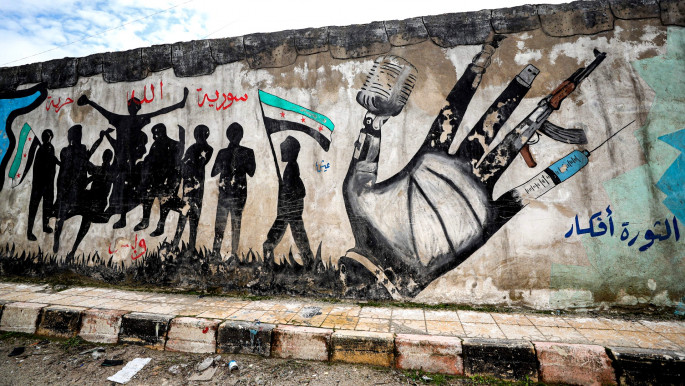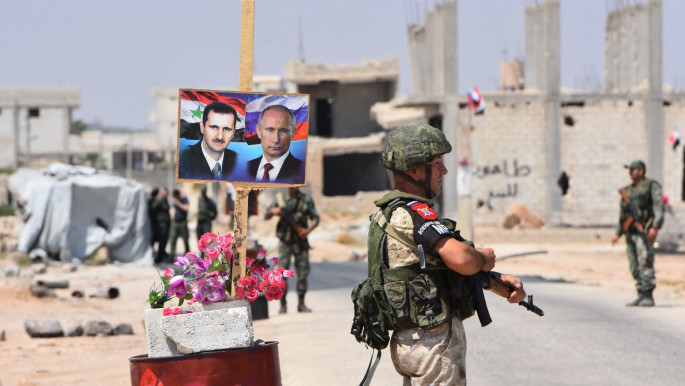Russia's history of bombing civilian infrastructure in Syria
Since September 2015, Russia has primarily intervened with airstrikes to support Syrian President Bashar al-Assad, claiming to fight the Islamic State, according to the Kremlin. With Russia's support, the Syrian army has been able to regain large parts of the country's territory, thus stabilising Assad's regime in the process.
Dr Nicolai Due-Gundersen, Political Analyst at the United Nations Institute of Training and Research, told The New Arab that Russian air support has been pivotal for Assad to maintain power. "Air campaigns can make or break a regime's ability to cling to power, as seen in Libya when NATO airstrikes targeted Gaddafi and prevented the regime from maintaining areas they had retaken or further expanding against rebels."
However, Russia's interventions in Syria have been linked to war crimes. Hospitals, schools and other vital infrastructure in Syria have been hit repeatedly during Russian airstrikes - not as collateral damage, which would have been devastating enough, but deliberately.
The latter would mark a clear violation of international law since combatants must direct attacks exclusively against military targets to avoid harming civilians or civilian objects and refrain from conducting campaigns that cause arbitrary or disproportionate civil damage.
 |
Hospitals, schools and other vital infrastructure in Syria have been hit repeatedly during Russian airstrikes - not as collateral damage, which would have been devastating enough, but deliberately |  |
Russia itself has now confirmed the aforementioned allegations – albeit accidentally. The Russian Defence Ministry released a video on 25 February to settle a dispute with Armenia, after Yerevan's Prime Minister Nikol Pashinyan claimed Russian weapons were ineffective in its war with Azerbaijan.
In the video, Russian Iskander missiles are seen hitting a variety of targets. But social media users managed to geo-locate the strikes in the footage using satellite imagery, determining that the target was the Azaz National Hospital, north of Aleppo.
 |
|
| Syria Insight: Russia's intervention five years on (Part 2) |
"The 9K720-E (Iskander-E) operational-tactical missile system has been tested and successfully used many times in combat conditions in the Syrian Arab Republic against international terrorist groups," Russia's Ministry of Defence said.
According to human rights organisations and the United Nations, the video should come as no surprise, as the list of potential war crimes committed by the Russian army is long.
In February 2016, five months after Russia had started its military intervention, the Syrian Observatory for Human Rights (SOHR) concluded that Russian airstrikes in Syria had killed approximately 1,700 civilians by attacking markets, hospitals, schools and houses.
Human Rights Watch states that between 26 January, 2016, and early February 2016, cluster bombs were used in at least 14 cases, killing 37 civilians and injuring dozens. Russia also reportedly dropped unguided incendiary bombs "similar to white phosphorus on to residential neighbourhoods in the Syrian city of Aleppo."
Amnesty International (AI) has also accused Russian forces of targeting hospitals and schools in Syria. AI investigated 25 Russian airstrikes in Syria between September and November 2015. According to AI assessments, which rely on testimonies, images and video material, as well as weapons experts, at least 250 civilians and a dozen fighters were killed in six of the attacks, while damage was caused in residential areas and medical infrastructure was destroyed.
 |
With Russia's support, the Syrian army has been able to regain large parts of the country's territory, thus stabilising Assad's regime in the process |  |
In one of the most devastating attacks on a market in the centre of Ariha in Idlib governorate, 49 civilians were killed. In addition, aerosol bombs were used in an attack on residential buildings on 15 October, 2015, in the small town of al-Ghantu in Homs Governorate, killing 46 people, including 32 children, according to AI. In March 2016, AI concluded that attacks on hospitals had become part of the Russian army's military strategy.
A recent AI report published in May 2020 reports attacks on five hospitals that needed to close afterwards, which led AI to speak of "serious violations of international humanitarian law", war crimes and crimes against humanity. These campaigns were part of an "established method" in Russia's intervention in the war.
In March 2020, the UN Commission of Inquiry on Syria (COI) published a report that examined Moscow's role in the destruction of civilian infrastructure in the opposition-held areas of the country. The report contains evidence that Russian jets were responsible for bombing both a marketplace and an emergency shelter for Syrians, both targets in no close proximity to military targets.
 |
|
| Read more: In the shadows of Syria's revolution, a generation of activists is born |
The commission had "reasonable grounds" to believe that a Russian aircraft was involved in the attack on the market. "In both cases, the Russian Air Force did not target a specific military target, but instead flew indiscriminate attacks on civilian areas, which is a war crime." More than 43 civilians were killed in the July 2019 attack on Idlib.
Germany reiterated the commission's conclusion. In February 2020, Germany's Foreign Minister Heiko Maas branded Russia's attacks on the civilian population as a war crime and demanded consequences. Assad and Russia were "bombing civil infrastructure," Maas said at a Security Council meeting the same month.
 |
Russia's bombing campaigns have exacerbated the humanitarian catastrophe of the war in Syria |  |
These bombings have exacerbated the humanitarian catastrophe of the civil war in Syria. Not only are basic facilities or the supply of clean water cut off repeatedly, but death and destruction have contributed to tens of thousands of Syrians having to flee from their homes. Around 5.5 million civilians have fled to Turkey or Europe, while six million more have been internally displaced to refugee camps in Syria.
Various European politicians have accused Russia of exacerbating a refugee crisis in Syria through its military operations. Germany's chancellor Angela Merkel said in February 2016 that she was "not only frightened but also appalled by the human suffering caused by the bombing of tens of thousands of people, primarily on the Russian side". Russia was violating a UN resolution against attacks on the civilian population, she said.
 |
|
| Read more: How Putin's Russia helped crush the Arab Spring |
But questions still remain as to whether or not Russia will be held accountable for these accusations. Human rights groups have been actively collecting evidence that may directly link Russian pilots to war crimes, potentially opening the door to prosecution and individual liability.
The latter notwithstanding, Moscow's military role in Syria will remain on many people's minds in the region for years to come. All the more since many atrocities have yet to be revealed. "It may have a long-term political effect on how citizens of the Middle East view Russia," Dr Nicolai Due-Gundersen says.
This could become an issue for Russia, given its intentions of acting as a facilitator between Syria and Israel and other MENA actors. "Should Russia want to deepen their influence across the region, their harm of civilians may cause a stigma similar to how the US is regarded after its many interventions," added Dr Nicolai Due-Gundersen. It will, however, be too late for the many thousands of innocent Syrian lives lost to Moscow's military actions.
Thomas O. Falk is a London-based freelance journalist who focuses on US affairs and the Middle East. He has written for Al Jazeera, Inside Arabia, il Giornale and other outlets.
Follow him on Twitter: @topfalk





 Follow the Middle East's top stories in English at The New Arab on Google News
Follow the Middle East's top stories in English at The New Arab on Google News


